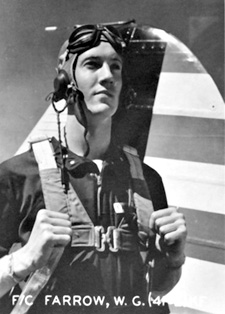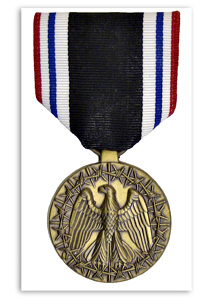
Lt. William Farrow was captured and executed after the Doolittle bombing raid on Japan in World War II.
The McDermott Library’s Special Collections department has received a medal that makes a poignant addition to the History of Aviation holdings.
The Prisoner of War Medal honors one of three airmen who were executed after a daring U.S. bombing strike on Japan 70 years ago. The medal joins the library’s James H. “Jimmy” Doolittle Archive, named after the raid’s planner and leader, Gen. Jimmy Doolittle.
On April 18, 1942, 80 volunteer aviators led by Doolittle took off in 16 twin-engine B-25 Mitchell bombers from the aircraft carrier USS Hornet on a mission to bomb targets in Japan.
Of the 80 Doolittle airmen of World War II, eight were captured by the Japanese.
The Japanese held a mock trial and found three of them guilty of war crimes, including Lt. William Glover Farrow of Darlington, S.C., the pilot of the last B-25 to take off from the USS Hornet. Facing a death sentence, Farrow was allowed to write a letter to his mother, Jessie, back in Darlington. On Oct. 15, 1942, a day after writing the letter, Farrow and two others were executed by firing squad.

Farrow’s POW medal is on display at the library near the Medal of Honor that Gen. Jimmy Doolittle received from Franklin D. Roosevelt.
The letter was not mailed. Instead it was found after the war in a Japanese file. “Don’t let this get you down,” the message said. “Just remember God will make everything right and that I’ll see you all again in the hereafter.” He closed with: “So let me implore you to keep your chin up. Be brave and strong for my sake. P.S. My insurance policy is in my bag in a small tent in Columbia. Read Thanatopsis by Bryant if you want to know how I am taking this. My faith in God is complete, so I am unafraid.”
In 1985 Congress authorized the Prisoner of War Medal to be presented, even posthumously, to anyone serving in the U.S. Armed Forces who had been taken prisoner and held captive after April 5, 1917. When the new POW medals were distributed in 1985, the Doolittle Tokyo Raiders Association received Farrow’s medal for safekeeping since no one knew of surviving family members. The medal was held by respective Doolittle Tokyo Raiders Association presidents until Col. Richard A. Knobloch died and his widow discovered the medal inscribed with Farrow’s name. She turned it over to the Raiders group, who in turn, sent it to the Doolittle Archive at The University of Texas at Dallas.
“The addition of Lt. Farrow’s Prisoner of War Medal to the Doolittle Archives stands as a testament, along with Doolittle’s Medal of Honor, to the bravery of Farrow and the 79 other men who took part in the Doolittle Tokyo Raid,” said Paul Oelkrug, coordinator of Special Collections. “Facing death by firing squad on trumped-up war crime charges, Farrow wrote his mother a farewell letter and stated calmly that he was prepared for his fate.”
The Doolittle Archives
at McDermott Library
The library’s Jimmy Doolittle Archives are on the third floor of McDermott Library in the History of Aviation Collection. The collection features artifacts, papers, books, photographs and personal effects of the airmen who took part in the raid.
The archive contains file folders about all of the Raiders kept by Doolittle over the years. McDermott Library personnel decided to review the Farrow file upon receipt of the POW medal. The file revealed clues about Farrow’s family.
Responding to an invitation to the Doolittle Raiders Reunion in 1948, Farrow’s mother Jessie wrote a letter of response and noted that her son had a sister named Margie Maus who lived in Ohio. In a letter from 1957 to the Raiders organization, Jessie wrote that she was living in Ohio near her daughter Marjorie and stated that she had five grandsons – “one named after my Bill.”
Jessie and Marjorie were deceased when the medal reached UT Dallas, but after a detailed search with the file information, the McDermott Library found the nephew – William Farrow Maus – and informed him that the Doolittle Archive had received his uncle’s POW medal. At last, after 25 years, the family of World War II hero William G. Farrow knew he had been recognized with another military honor along with the Distinguished Flying Cross for Extraordinary Achievement, the Order of the Clouds decoration from the Chinese, the Purple Heart, and a Presidential Citation.
The Farrow POW medal is now on display in Special Collections not far from the Medal of Honor that Doolittle received from Franklin D. Roosevelt. Doolittle accepted it on behalf of all the Doolittle Raiders.
Farrow’s final message to his mother was reprinted in newspapers throughout the world and served as an inspirational message for parents who had lost sons in the war. Farrow’s ashes were recovered from Public Cemetery No. 1 outside of Shanghai after the war. His remains were reburied at Arlington National Cemetery.